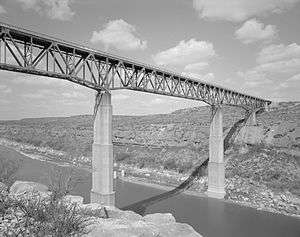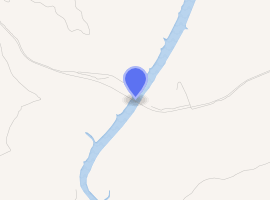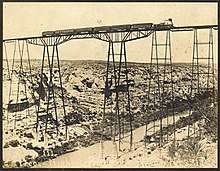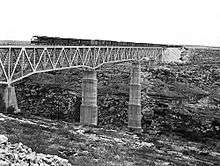Pecos River High Bridge
The Pecos River High Bridge carries the Union Pacific Railroad across the Pecos River gorge and is the second high-level crossing on this site.
Pecos River High Bridge | |
|---|---|
 Pecos River High Bridge, late 1990s | |
| Coordinates | 29°45′24″N 101°21′25″W |
| Carries | Union Pacific Railroad |
| Crosses | Pecos River |
| Locale | Langtry, Texas |
| Characteristics | |
| Design | Deck truss |
| Material | Steel |
| Longest span | 374.5 feet (114.1 m) |
| No. of spans | 7 |
| Piers in water | 2 |
| History | |
| Designer | Modjeski and Masters |
| Constructed by | Brown and Root, substructure; Bethlehem Steel Company, superstructure |
| Construction start | 1943 |
| Construction end | 1944 |

| |
History


The first Pecos River Bridge, designed by SP chief engineer Julius Kruttschnitt, was built by the Phoenix Bridge Company and completed in 1892. After strengthening and reinforcement in 1910 and again in 1929 which almost doubled its weight, it remained in place until 1949, five years after its replacement. The second Pecos River High Bridge, was completed by the Southern Pacific Railroad on December 8, 1944.[1]
The current Pecos River High Bridge is a steel deck truss bridge on slip-formed concrete piers, ranging in height up to 275 feet (84 m). It was designed by Modjeski and Masters of Harrisburg, Pennsylvania, with foundations constructed by Brown and Root of Houston and trusses fabricated by Bethlehem Steel Company of Chicago. Because of material rationing during World War II, War Production Board approval was required before proceeding with fabrication.[2]
Route
In addition to freight trains of the Union Pacific (which merged with the Southern Pacific in 1996), this bridge carries Amtrak's Sunset Limited between its stations in Sanderson and Del Rio.
References
- Baker, T. Lindsay (1986). Building the Lone Star State: An Illustrated Guide to Historic Sites. College Station: Texas A&M University Press. p. 124.
- Spivey, Justin M. (October 1998). "Southern Pacific Railroad, Pecos River Bridge" (PDF). Historic American Engineering Record. Washington, D.C.: Library of Congress. p. 7. Retrieved March 3, 2018.
External links
![]()
- Pecos High Bridge from the Handbook of Texas Online
- Historic American Engineering Record (HAER) No. TX-75, "Southern Pacific Railroad, Pecos River Bridge", 8 photos, 2 color transparencies, 9 data pages, 1 photo caption page
- Pecos Viaduct (1892) at Structurae